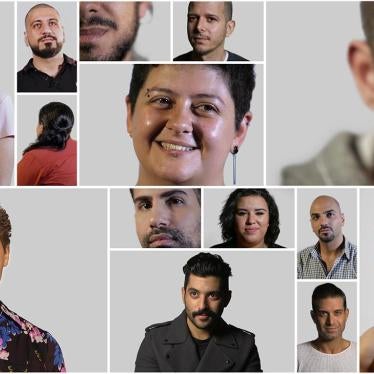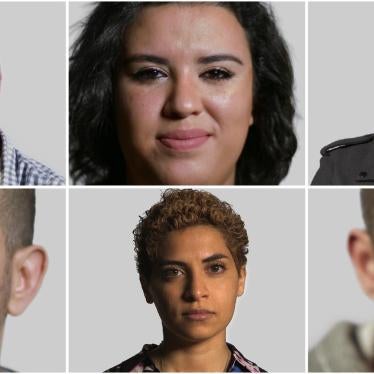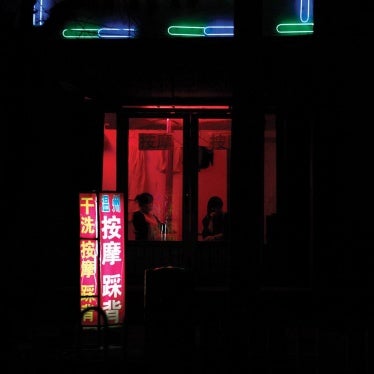H.E. Hussein Ali Al-Hilali
Attorney General
Sultanate of Oman
Via email to the Oman Human Rights Commission
Via fax to the Oman Human Rights Commission: +968 24218906
May 22, 2018
Your Excellency:
We write on behalf of Human Rights Watch to express our deep concern regarding the recent arrests and convictions of several individuals under a provision of Oman’s 2018 Penal Code that criminalizes “imitating the opposite sex.”
On January 27, the Royal Oman Police announced on Twitter that they had arrested “a number of men in women’s clothing” in the town of Salalah, in Dhofar Governate, following the circulation of images from a private party on social media. One of the guests allegedly had shared photos from a private birthday party on the instant messaging application Snapchat, which came to the attention of the police. The police, who apparently determined that some partygoers were dressed in clothing not corresponding to their assigned sex, proceeded to arrest four of them.
On February 15, a court in Salalah convicted the four on charges of immoral conduct, under article 265 of the penal code; “imitating the opposite sex,” under article 266(d) of the penal code; producing or distributing material that violates “public ethics,” under article 17 of the Cyber Crime Law of 2011; and “assisting” in the production or distribution of such material, under article 31 of the Cyber Crime Law, according to two Omani activists familiar with the case. The activists said that the court sentenced each of the four people to three years in prison, a fine of 3,000 Omani riyals (about US $7,800), and a month of street cleaning for four hours a day, and that the court also confiscated one defendant’s mobile phone and suspended his social media accounts as part of the sentence.
In another case reported in the Times of Oman on March 11, the Royal Oman Police stated that “Police in Al Buraimi managed to arrest an [expat of] Asian nationality in Al Buraimi park, dressed in women’s clothing, which was a ‘women’s only day’ at the park.” According to the police statement, the person arrested wore an abaya, niqab, and headscarf.
We understand that the police may have an interest in ensuring that women-only spaces remain safe and exclusive for women, and we may not have material information about these cases to which you may be privy. However, we are concerned that these cases may involve the arrest of persons who identify as transgender. If that is the case, we are concerned that the arrested persons may be victims of discrimination on the basis of their gender identity or expression. We appreciate any further details you can provide regarding these cases.
Particularly with regard to the Salalah case, we are disturbed that the Royal Oman Police and the judiciary appear to be interfering with the lives of private citizens simply for wearing the clothing of their choice. Under article 19 of the Universal Declaration of Human Rights, everyone has the right to freedom of expression, which can be manifested in their attire. As a party to the Convention on the Elimination of All Forms of Discrimination against Women, Oman is obligated to pursue policies to eliminate intersecting forms of discrimination, including discrimination based on gender identity.
We take note that Oman only recently made “imitating the opposite sex” a crime under article 266(d), carrying a one-year prison sentence, under a new penal code promulgated January 15, 2018. In doing so, Oman joins Kuwait and Malaysia as one of the few countries in the world that directly criminalizes gender expression, effectively making transgender people’s very identities illegal. Such regressive laws violate the right to freedom of expression and infringe upon transgender peoples’ rights to privacy, non-discrimination, and freedom of movement.
We strongly urge the government to repeal article 266(d) and other vague morality laws, such as those invoked in the Salalah case, which can be used in a discriminatory manner to target people based on their gender identity or sexual orientation. In the meantime, we urge you to implement a moratorium on arrests under article 266(d).
We request that you kindly confirm whether our understanding of the facts of these two cases is accurate, and provide information about the current status of all five individuals who appear to have been prosecuted solely for expressing their gender identity. We urge you to reverse the convictions of the four people sentenced in Salalah on the basis of their attire at a private birthday party, and to release them if they remain in custody. We also request that you examine the case in Al Buraimi to determine whether police arrested the person in question based on the person’s gender identity, and if so, to release the person accordingly.
Thank you in advance for your attention to this matter. We look forward to further engagement with you on human rights in Oman.
Should you have any questions or concerns or wish to provide more details, please do not hesitate to contact Neela Ghoshal, Senior Researcher.
Best regards,
Sarah Leah Whitson
Director, Middle East and North Africa Division
Graeme Reid
Director, LGBT Rights Program
cc:
Oman Human Rights Commission







